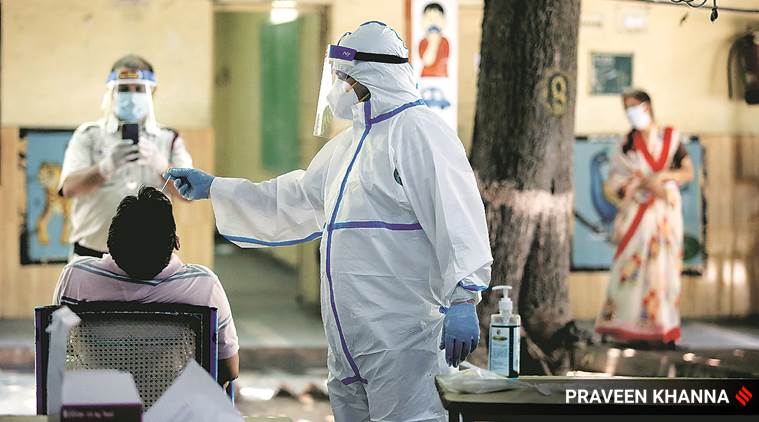 At present, Delhi carries out 20,247 tests per million population. Praveen Khanna
At present, Delhi carries out 20,247 tests per million population. Praveen Khanna
Days after Lieutenant Governor Anil Baijal made it mandatory for all positive patients in Delhi to visit a Covid Care Centre for clinical assessment to determine if they can opt for home isolation or not, the order was “modified” on Thursday. The earlier system, which allows assessment at home by a “home isolation team”, has been reinstated.
The decision was taken at a meeting of the Delhi Disaster Management Authority chaired by Baijal. With 73,780 cases so far, Delhi is the worst-hit city in the country.
“The patient shall be allowed home isolation if, as per the assessment of home isolation team sent by the district surveillance officer, the patient is mild/ pre-symptomatic/ asymptomatic and has a residence of two rooms or a separate room and a separate toilet for the patient,” said a statement released by the L-G Secretariat.
The AAP government had opposed the new protocol, which came into effect on June 22, saying it was “nearly impossible” to implement it. Both Chief Minister Arvind Kejriwal and Deputy Chief Minister Manish Sisodia had criticised the move and raised the issue with the Centre.
Kejriwal, Sisodia and other senior functionaries were present at the meeting today.
Addressing a webcast after the meeting, Sisodia said: “We are happy that our demand to reinstate the previous system has been accepted. The method of home isolation has been highly successful in Delhi, where at least 30,000 patients have recovered while being at home.”
According to the statement released by the L-G Secretariat, patients found fit for home isolation will be provided a contact number for medical consultation, along with the phone number of CATS (Centralised Accident and Trauma Services) for calling an ambulance in case the symptoms worsen.
“If the said patient has moderate/ severe symptoms with co-morbidities, he shall be transferred to the care centres, health centres or hospitals. In case his residence is not found to be fit for home isolation by the surveillance team, the patient will be admitted to a Covid Care Centre for isolation as per the Union Ministry of Health and Family Welfare guidelines,” said the statement.
Meanwhile, the Ministry of Home Affairs (MHA) said the decision was taken on June 21. “Today’s SDMA decision on home isolation of Covid-19 positive patients in Delhi is a reaffirmation of the decision taken at the meeting held by Union Home Minister Shri @AmitShah on 21st June and communicated to Delhi Govt on 22.06.20,” the MHA spokesperson tweeted.
After the June 21 meeting, the MHA had said in a statement that the “Home Minister also said that all Covid-19 positive cases should be first referred to Covid centres and those who have adequate facilities at home and do not suffer from other co-morbidities, can be allowed to stay in home isolation.”
Subsequently, the Delhi Directorate General of Health Services had said on June 22 that for “mild/ pre-symptomatic (cases), the patient will be shifted to Covid Care Centre to assess eligibility for home isolation”.
Baijal’s office tweeted that today’s decision was taken “in accordance with the guidance” given by Shah.
Last week, the L-G had ordered compulsory 5-day institutional quarantine for all positive cases. The Delhi government opposed the move, saying there wasn’t enough space to house almost 3,000 patients per day for five days. The L-G then amended this order, and made it mandatory for all positive patients to visit Covid Care Centres for clinical assessment.
According to this protocol, those who tested positive through the RT-PCR method had to be taken to Covid Care Centres in an ambulance for clinical assessment. A separate team would visit their homes to decide if they could opt for home isolation.
Those who tested positive in the rapid antigen tests would be assessed on the spot and allotted home isolation, hospital admission or institutional quarantine, depending on their condition and facilities at home.
The L-G had also struck down the Delhi government’s contract with a private healthcare company for remote monitoring of patients under home isolation. The DGHS has, however, in its revised guidelines, allowed outsourced companies to monitor patients under home isolation over telephone.